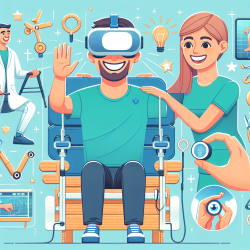As practitioners dedicated to improving the lives of children through speech-language therapy, it's essential to continually seek evidence-based strategies that yield the best outcomes. Recent research titled "Consistent long-term practice leads to consistent improvement: Benefits of self-managed therapy for language and cognitive deficits using a digital therapeutic" provides compelling data supporting the efficacy of self-managed digital therapy.
Conducted by Liu, Cordella, Ishwar, Betke, and Kiran (2023), this study utilized data from the Constant Therapy app to evaluate the impact of consistent, long-term practice on therapy outcomes. The findings are particularly relevant for practitioners looking to integrate digital tools into their therapeutic repertoire.
The Power of Consistency in Digital Therapy
The study analyzed two cohorts of post-stroke patients who used the Constant Therapy app over a 30-week period. The first cohort consisted of 537 consistent users, while the second included 2,159 users with variable practice patterns. Patients were grouped into three dosage categories: low (0-15 minutes/week), medium (15-40 minutes/week), and moderate (greater than 40 minutes/week).
The results were illuminating:
- Consistent users practicing more than 40 minutes per week showed the greatest improvement in therapy outcomes.
- Medium dosage (15-40 minutes/week) also led to significant gains compared to low dosage (0-15 minutes/week).
- Even in the variable cohort, higher weekly practice amounts were consistently associated with better performance outcomes.
Implications for Practitioners
These findings underscore the importance of consistent, long-term practice in achieving significant therapy outcomes. For practitioners, this means encouraging and facilitating regular practice schedules for your clients. Here are some actionable steps:
- Integrate Digital Tools: Utilize digital therapeutic apps like Constant Therapy to provide a structured yet flexible practice environment.
- Set Realistic Goals: Encourage clients to aim for at least 40 minutes of practice per week, spread across multiple days.
- Monitor Progress: Regularly review app data to track improvements and adjust therapy plans as needed.
Encouraging Further Research
While the study provides robust evidence supporting the benefits of consistent digital therapy, further research is always valuable. Practitioners are encouraged to conduct their own evaluations and share findings with the broader community. This collective effort can lead to even more refined and effective therapeutic strategies.
To read the original research paper, please follow this link: Consistent long-term practice leads to consistent improvement: Benefits of self-managed therapy for language and cognitive deficits using a digital therapeutic.










